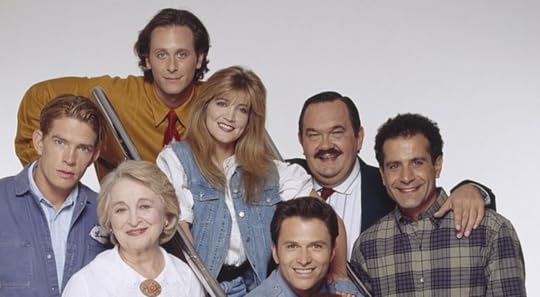Matthew Aaron Browning's Blog, page 2
January 2, 2019
Guilty Pleasure Reads
I was recently discussing with a friend guilty pleasures in terms of entertainment – books, music, television, etc. The fact is, there isn’t too much entertainment I consume that I feel guilty about. I don’t shy away from my love of old sitcoms, folk music, and, as I’ve often been told, things little old ladies would like.
In fact, the older I get, the more abundantly clear it is that I inherited a lot of my personality traits from my two grandmothers. My mom’s mom was perhaps a simple country woman (not simple as in intelligence, more in lifestyle) who sat around in her housecoat smoking cigarettes and feeding Cheetos to her lap dog. My dad’s mom, conversely, was more the southern dame type, who drove a gigantic Oldsmobile, wore church hats, and was an active member of the local woman’s club. The former loved game shows and The Golden Girls; the latter devoured Agatha Christie novels and was a faithful Murder, She Wrote viewer.
And I love all four of those things.
In fact, in terms of my reading habits, I suppose if I were to classify something as a guilty pleasure, it would be my love of cozy mystery novels. From Hercule Poirot to Sherlock Holmes, Armand Gamache to Cormoran Strike, I do love a good whodunnit. And I suppose it doesn’t get much cozier than the book series based on the Murder, She Wrote TV show: my choice for guilty pleasure read.
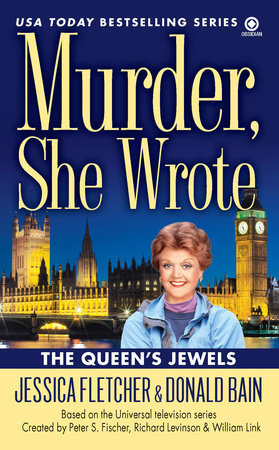
For you youngsters, Murder, She Wrote was a series that ran on CBS from 1984 to 1996 and starred Angela Lansbury as murder-mystery writer Jessica Fletcher. Each week, Jessica found herself surrounded by a dead body and a roster of suspected celebrity guest stars of varying degrees of impressiveness (Vicki Lawrence, Bert Convy, Kristy McNichol, virtually the entire cast of WKRP in Cincinnati at one point or another, to name a few). By the end of the hour, Jessica’s busybody butting-in and deductive reasoning skills would solve the murder before the frustrated and occasionally bumbling police detective of the week.
Back in the nineties, a series of novels emerged based on the show, penned by the fictional Jessica Fletcher along with Donald Bain. I discovered them when I was about 16 and started reading them (which should tell you everything you need to know about teenage me). Each book was essentially an episode of the show in novel form: Jessica is off on some adventure – visiting relatives, vacationing, publicizing her latest novel, or occasionally just strolling around her New England village – when the inevitable dead body turns up. Just like the series, the cases in the novels aren’t all that electrifying, the murders hardly detailed in gruesome or violent fashion, and the prose not necessarily eloquent or terribly prolific. But that isn’t to say they aren’t enjoyable. With titles like A Little Yuletide Murder and A Fatal Feast, they’re like literary chicken soup or hot chocolate – warm and cozy and a way to escape for a bit into an interesting yet stress-free little story.
Despite the show having ended two decades ago, the book series continues to this day. Donald Bain after having written more than 40 books in the Murder, She Wrote series. Jon Land has since taken over. I’ve read the series on and off for years and have recently rekindled an interest when finding a bunch of the books on my bookstore hunt. Revisiting Jessica has made for a lovely escape from the real world.
So that’s my guilty pleasure that I’m not all that guilty about. What are some of your favorite guilty pleasure reads? Let me know in the comments!
November 20, 2018
I Did a StoryCorps Interview. Here’s What Happened.
In September, I had the pleasure of stepping into an Airstream trailer in downtown Charleston with my friend, Tabitha Surface, microphones placed between us at a small table in a dimly lit booth with a silent facilitator in the corner watching over us, to record a conversation about being LGBT in Appalachia. It was part of StoryCorps, and it was truly moving.
 If you aren’t familiar with it, StoryCorps is a non-profit organization whose mission is to record, preserve and share the stories of Americans from all backgrounds and beliefs. One of the ways they do this is through a mobile unit, which parks itself in a city for a period of time and invites people to sign up for a recording session to talk about whatever they want to discuss. The recorded conversations are archived, with snippets of some of them aired on NPR.
If you aren’t familiar with it, StoryCorps is a non-profit organization whose mission is to record, preserve and share the stories of Americans from all backgrounds and beliefs. One of the ways they do this is through a mobile unit, which parks itself in a city for a period of time and invites people to sign up for a recording session to talk about whatever they want to discuss. The recorded conversations are archived, with snippets of some of them aired on NPR.
When I heard through Fairness West Virginia that LGBT people were encouraged to share our stories during StoryCorp’s Charleston visit, I immediately signed up. I knew that Tabitha identifies as the “B” in LGBT and thought she’d be a great person to converse with – partly because she’s an extremely interesting person and partly because she and I fall into the “casual” friend category. We know one another primarily through our day jobs and have only infrequently socialized outside of that arena. Sometimes it’s easier to bare your soul to someone who doesn’t already know everything about you. Luckily, she was game.
What followed was a 40-minute conversation in which we began tearing down the proverbial walls. I shared stories that I’ve never shared before with close friends, let alone on the (literal) record. We discussed being LGBT in West Virginia, coming out, how Charleston has changed in terms of its acceptance, and what it’s like to be thirtysomething and single – among other things…some of which I still can’t believe I shared.
Below are a few of the more soul-baring excerpts from my part of the conversation.
On Being Gay in the Nineties…
Tabitha: When did you come out?
Me: 1999. So I was 19 years old, living in a very, very small coal town in the southern part of West Virginia. And, again, this was the 90s, right? So this was pre-Will and Grace…well, Will and Grace was maybe just getting started. Ellen came out when I was in high school, so she was around. But you just didn’t have the acceptance that you do today. So I was fearful for a lot of years and in complete denial about it. But it turned out okay. It wasn’t necessarily easy when I came out, but it wasn’t as bad as I thought.
Tabitha: You feel pretty accepted by your family now?
Me: Now, extremely. But back then…I grew up in a church-going family. My mom taught Sunday school. My dad was never much into church, but we went to church every Sunday. And I can’t point to times when I remember explicitly being told gay is wrong, but somehow that sort of bleeds into your psyche. So I always felt that being gay was weird and wrong, and you heard words like “queer” and “faggot” thrown around, and I was called those things as a kid growing up. So you build this wall around yourself. Deep down, I knew that’s maybe what I was, but I wasn’t ready to say it, even in my own head – if I even think it in my own head, then my goose is cooked, and that’s it, there’s no going back.
Tabitha: That’s very much how I was. I used to do this thing where I’d lie in bed at night and say, “You can’t be gay because you like boys. You can’t be gay because you like boys.” And be freaked out. I had rules about the clothes I would wear. I couldn’t wear polo shirts or cargo pants.
Me: Because they looked boyish?
Tabitha: Yeah, because people would totally know then that I was gay. I had a whole list of rules. My sister had a friend who dated a guy who was bisexual in high school, and I remember them talking about how disgusting it was, so I spent a lot of my life going, “No, you can’t do this. That’s not okay.”
On Boys’ Things and Girls’ Things…
I wanted to play with Barbie dolls, but I didn’t have little girls around me to have access to them, so I told my grandma that I wanted to play with them. We cooked up this scheme where we would go buy some and tell people they were for my cousin, who was a girl. I remember being in Kmart or Magic Mart or something – it was like 1986 or ‘87 – and she was buying them for me. And she tells the sales clerk that they were for me. I wanted to curl up in a ball and die. I was like, “No, they’re not. They’re not for me.” And even the sales clerk was like, “It’s okay. Boys play with this stuff, too.” But I was mortified. Looking back now as an adult, in hindsight, Granny was pretty progressive to have bought me that stuff. I wish I could’ve appreciated that. I wish she was still around so I could tell her, “Hey…thanks.”
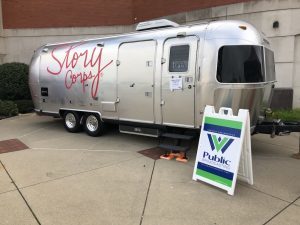 On Telling My Parents I’m Gay…
On Telling My Parents I’m Gay…
I sort of told my mom. I like cried to the point that she guessed what I was trying to tell her and just kind of said it for me. I think I remember saying, “I don’t want to be a disappointment to you.” And she said, “You wouldn’t be.” She also [jokingly] said, “We won’t be having any more boys spend the night!” Fair enough. I didn’t want to tell my dad. My dad’s not a harsh or abrasive guy, but he was a game warden. Hunted. Fished. Like I said, we lived in a little coal town. I was introducing things that they weren’t necessarily familiar with, so I didn’t want to tell Dad. So my mom told my dad for me.
On Building Emotional Walls…
Tabitha: Do you think that tendency to build walls has impacted other areas of your life?
Me: I don’t think there’s an area of my life it has not impacted. I’m an arm’s length from my cats sometimes! I mean, those walls went up when I was a teenager. My coping mechanism was writing. Instead of talking to people and talking to my family, I would just write it all down. You just build these walls around yourself where you’re sort of living in solitude. My walls were literally my bedroom walls, and it’s hard to tear that down. I go back home now, and I revert to 15-year-old me in a sense. I still don’t tell my family a whole lot of things that go on.
……….
Those are only a few excerpts from a longer, deeper, and quite cathartic conversation. You can listen to the full discussion here.
It was nothing but a pleasurable experience – one that surprised me, I think surprised Tabitha although I won’t attempt to speak for her, and one that, on the whole, surprised our facilitator, Madison Mullen. I spoke to Madison at a wrap-up celebration and asked her how she felt about her time in the Mountain State – specifically the number of LGBT contributors to the project.
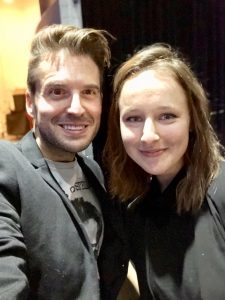 “I think that my experience has largely been witnessing a lot of stereotypes being broken,” she said. “I’m not from West Virginia, and I’ve never been here, but everything I’ve heard about – especially following the 2016 election – was portraying Appalachia and West Virginia in a particular way. I was completely overwhelmed and also shocked at the representation from the LGBT community. Not only in their forward-thinkingness and their reflections on what it means to be gay or different at all in Charleston, but also a lot of folks from the community talked about issues of acceptance as well. I think that, for the community to have this archive, is going to be really meaningful.”
“I think that my experience has largely been witnessing a lot of stereotypes being broken,” she said. “I’m not from West Virginia, and I’ve never been here, but everything I’ve heard about – especially following the 2016 election – was portraying Appalachia and West Virginia in a particular way. I was completely overwhelmed and also shocked at the representation from the LGBT community. Not only in their forward-thinkingness and their reflections on what it means to be gay or different at all in Charleston, but also a lot of folks from the community talked about issues of acceptance as well. I think that, for the community to have this archive, is going to be really meaningful.”
I agree. At the end of Tabitha’s and my discussion, I said to her, “I feel like I know you so much better. I even feel like I know myself a little bit better.” And that is a powerful thing.
If StoryCorps ever comes to your town, find a friend, loved one, acquaintance, even a stranger, and go.
September 25, 2018
Literary Tattoos
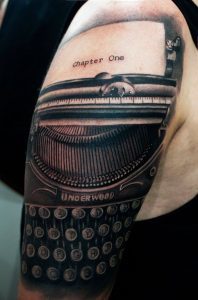 When I told my dad recently that I was getting a rather large tattoo of an antique typewriter on my arm, he asked, “Now, why do you do that?” It wasn’t judgmental or harsh in tone. It was simple inquiry. So simple, in fact, I didn’t know how to answer him. Mind you, both of my siblings have tattoos, so this was nothing new for my folks. My brother has full sleeves on both arms and then some.
When I told my dad recently that I was getting a rather large tattoo of an antique typewriter on my arm, he asked, “Now, why do you do that?” It wasn’t judgmental or harsh in tone. It was simple inquiry. So simple, in fact, I didn’t know how to answer him. Mind you, both of my siblings have tattoos, so this was nothing new for my folks. My brother has full sleeves on both arms and then some.
So when Dad asked why anyone gets tattoos, I wasn’t sure how to articulate it. I don’t even remember how I answered him. I probably deflected the question and changed the subject. (In other words, I went with my strengths.)
If I were to formulate an answer, I guess it’d be this: I’ve long had an affinity for body art, which for whatever reason tends to surprise people. I find nicely done tattoos to be expressive, creative, personal and, okay, sexy. And really that’s enough of an explanation, isn’t it?
The operative word in that answer is “personal.” I hear lots of people say, “I want a tattoo, but I don’t know what I’d get.” Fair enough. It’s definitely not something to rush into. It took me a long time to figure out what I wanted. Well, sort of. On my 28th birthday, I got a little Libra symbol just above my ankle. Not on a whim, but without nearly the thought and research I put into the typewriter. It’s very small, only about an inch and a half wide. It’s perfectly lovely, but it was a starter tattoo. I’ve always said I’d get more ink in honor of each book I publish. Well, that hasn’t happened yet, and I’ve been getting impatient, itching to get something new.
Then I finally landed on an idea that really revved me up. I wanted something literary-themed. At first, I was a bit all over the place with the idea. I knew I wanted a typewriter, but I also wanted imagery that would illustrate a handful of my favorite books. I wanted big, as in a half-sleeve, but I knew that was a lot to fit into a cohesive design. I’m rather scrawny, after all. My arms don’t provide a huge canvas.
I started researching artists in my city. Charleston, W.Va., is a small town that calls itself a city, but we have several talented tattoo artists here. I asked around, put out feelers, scoured the Internet. I even emailed with a pretty popular local artist who sort of ghosted me mid-convo, perhaps because my idea was still a bit broad for him…I don’t know. I found that annoying at the time, but I’m glad he did it, because it led me to the artist I ended up working with.
“You should go to Devin Hodge at Lost Time,” my hairstylist told me.
I was familiar with Devin. Some relatives and friends have gone to her. I looked at her online portfolio and was blown away by her skill for realistic artwork. That’s what I wanted. So I reached out, despite knowing she has a very long wait. I didn’t mind. And she loved the concept. We began a dialogue through Facebook and soon landed on something that we both seemed to love. Eventually, I found myself sitting in Devin’s chair, looking around her studio in awe. An artist in all aspects of the word, her studio is a virtual Pee-Wee’s Playhouse of creativity, originality, and just plain fun. And, well, you can see what she came up with.
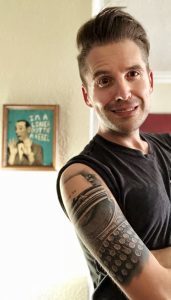 And I’ve remained in awe ever since. I’m considering cutting the sleeves off of every piece of clothing I own just so I can stare at my own arm all day. The intricacy of her detail work is stunning, and I couldn’t be happier. We settled on “Chapter One” for the wording because of space and as a bit of inspiration to write – which I need these days.
And I’ve remained in awe ever since. I’m considering cutting the sleeves off of every piece of clothing I own just so I can stare at my own arm all day. The intricacy of her detail work is stunning, and I couldn’t be happier. We settled on “Chapter One” for the wording because of space and as a bit of inspiration to write – which I need these days.
As I showed it off, the questions came rolling in: Did it hurt? (I describe it as a tolerable discomfort instead of outright pain, although certain areas did hurt more than others, especially after hours in the chair.) How long did it take? (About 12 hours in two visits.) How much did it cost? (I’m not one to broadcast such things, but it was a reasonable rate and worth every penny.) She’s amazing, how do I get in touch with her? (Devin prefers Facebook. She’s selective about what she takes on and has a long wait time, but just look at the results.)
And the other question I’m getting a lot: When’s your next one? Well, this one is freaking huge, as you can see, and will probably satisfy my craving for a while. But I do still plan to get something in honor of any books I publish. And that idea of pulling elements from my favorite books into a sort of collage is still intriguing. And…well, I could keep going.
But I’ll stop now. I need to go stare at my arm.
Do any of you have literary-themed tattoos? Show me in the comments!
September 21, 2018
Am I Even a Writer?
Pity, party of one. I’ve been in one hell of a terrible writing slump for probably a year or more, trying and failing to pump some life into a lagging writing career. I’m happy to report that I’m emerging from it, but it’s been a rather dreary time. I thought I’d share a little about why I’ve been feeling this way. Perhaps it’ll help other writers trying to dig their way out of the hole.
My slump came to a head very recently when two things happened in the same day. First, I caught the 1987 film “Throw Momma from the Train” with Billy Crystal, Danny DeVito, and Anne Ramsey. I hadn’t seen it in 30 years and remembered very little about it, like the fact that Billy Crystal’s character is a novelist experiencing writer’s block. I identified immediately with the fact that he couldn’t even finish the first line of his novel. The night was…humid? Moist? Hot? Luckily, the titular Momma came to Billy’s rescue eventually:
I feel ya, Momma. Anyway, later that evening, I attended an event at which I met several people for the first time. With such introductions comes the inevitable question, “What do you do?” I typically respond with an explanation about my day job in higher education marketing. It’s provided for me a rather successful career, after all. And it pays the bills. But it isn’t how I want to answer the question.
I want to lead with, “I’m a writer.” Sometimes I do. I try. I even jokingly offer the same explanation I’m offering here – that I want to say I’m a writer first, a marketing person second. But it still feels not quite right. And why? I know I’m a writer. I know the simple act of writing makes me a writer. Not a book on shelves. Still, though, I sometimes hear that nagging voice in my head asking, “Am I even a writer?” Why do I do this?
Here are a few reasons – the ones that have been nagging me the most lately.
My lack of activity around this site for pretty much all of 2018.I’ve blogged twice since the beginning of the year and neither post had a thing to do with writing. (I recently removed them for that purpose.) I’ve tried. I’ve attempted to conjure up the motivation to blog, but nothing has come. It makes me feel like I’m not a writer sometimes. But I keep going.
My lack of a successful publishing contract. I’ve been with my agent for several years now. I mistakenly thought signing with an agent would be a fast track to publishing. It is not. It gets you in front of more editors, but those editors still have to want your book. I’ve come close but, alas, no luck so far. I’ve written three Young Adult manuscripts, all of which simply feel a bit dated now. I’m working on ideas to freshen up (read: totally rewrite) one of them right now, making it less 2008 and more 2018. We’ll see. I’ve ventured into children’s book territory with a story that’s gotten favorable feedback but, again, no sell yet. It’s extremely discouraging. It makes me feel like I’m not a writer sometimes. But I keep going.
My lack of finishing a damn book. I’m great at ideas. I’m great at starting manuscripts. I’m great at outlining, even if it’s just in my head. I’m terrible at actually bringing these ideas full circle. I’ve got at least five, perhaps more, unfinished manuscripts in my files. They all have promise, even if the idea isn’t fully baked. They all have characters that I already adore, even if they are still in pieces. They all deserve to have their story fully told, even if I can’t sit my ass down and do it. It makes me feel like I’m not a writer sometimes. But I keep going.
So these things, when replayed over and over in your head, can really wear down your energy to work. To create. To produce. Put that together with a busy day job, other responsibilities, social and family commitments, gym time, all the excellent TV there is to watch and books there are to read! (Don’t even ask me what a ‘date’ is. I’m not sure I’d remember.) Suddenly an entire year has gone by, you’ve barely accomplished anything, and you’re no closer to your goal of being a writer than you were five years ago. Well, an income-generating writer with a product to peddle, I should clarify.
As I said, I am emerging from this drudgery. I’m back to work on one of those unfinished manuscripts and playing with those rewrite ideas. I’m polishing up this website a bit and reviving my social media presence. I even got a big-ass tattoo on my arm of an antique typewriter that I’m treating like my own version of Tony Stark’s Iron Man life force heart thingy. Things are looking up.
But I’ll elaborate on all that soon enough. In the meantime, if you’re a writer (or especially if you’re beginning to think you aren’t one anymore), how do you overcome the low points, the valleys in which you’re riddled with self-doubt and inactivity? Share in the comments!
January 16, 2018
5 Reboot-Ready Sitcoms (And How To Do It)
I’ve sampled Fuller House and Girl Meets World. I’ve kept up with Will and Grace, if only out of some sense of obligation. I’ve already offered my take on the forthcoming Roseanne. And I’ve clicked on the headlines when I’ve seen talks of possible Coach (which didn’t come to be) and Mad About You reboots, despite never really digging either show. (For what it’s worth, while they aren’t sitcoms, I also tuned in for Psych: The Movie, Twin Peaks: The Return and Heroes: Reborn.)
Going back even further than the current crop of TV series revivals, as a kid I vividly remember tuning in to The New WKRP in Cincinnati, The New Leave it to Beaver and the ill-conceived Bradys. (Seriously? The Brady Bunch as an hour-long drama? Just…why?)
So, yes, I confess: I am a junkie for a good sitcom reboot. Hell, even a bad one. In fact, the revival craze got me thinking about some other shows I would love to see resurrected – and how they might pull it off. I’m purposefully avoiding the obvious, i.e. your heavy-hitters like Seinfeld, Friends, Cheers, etc., instead aiming for some perhaps less-obvious choices.
That being said, here are five sitcoms that I think (sort of) deserve the reboot treatment.
Empty Nest (NBC, 1988-1995)
Original Premise: Widowed pediatrician Harry Weston (Richard Mulligan) juggled life as a middle-aged bachelor and father to a trio of adult daughters – two of whom (Kristy McNichol as Barbara and Dinah Manoff as Carol) moved back in to his swanky Miami home, which happened to be next door to The Golden Girls. Harry’s sleazy neighbor Charley (David Leisure), homespun nurse Laverne (Park Overall) and scene-stealing dog Dreyfuss rounded out the original crew. McNichol’s departure midway through the run led to some shuffling, with Night Court alumna Marsha Warfield coming aboard as Harry’s associate and Estelle Getty reprising her Golden Girls role for the last couple of seasons. (Sophia lived at nearby retirement home Shady Pines and hung out with the Westons for an apparent lack of anything better to do.).
Where We Left Off: Harry sold the house and took a teaching job in Vermont. Carol and Laverne married their respective boyfriends, with Laverne moving back to her Arkansas hometown.
Reboot Premise: A widowed Carol (now a self-published author of self-help books – Manoff’s own idea) buys and moves back into Harry’s house, along with her two adult sons. Charley is still next door and exactly the same. Golden Girl Rose Nylund has moved into Shady Pines and is now the “Sophia” of the Weston house (because…Betty White).
What are the odds? Zilch. Let’s face it: Despite my own efforts (I’ve operated this website for two decades), Empty Nest hasn’t had the pop culture longevity of many of its peers (especially its sister show, The Golden Girls), so no one is clamoring for it to return. An even bigger problem is the fact that the cast isn’t all that visible anymore. Mulligan died in 2000, and the rest of the principals are largely retired. McNichol hasn’t acted since the show’s finale, while Manoff relocated to Washington, Leisure to Utah and Overall to Tennessee.
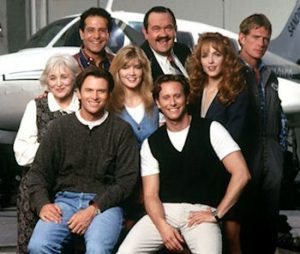 Wings (NBC, 1990-1997)
Wings (NBC, 1990-1997)Original Premise: Two estranged brothers, Joe and Brian Hackett (Tim Daly, Steven Weber), reunited to run a fledgling commuter airline on Nantucket. Aspiring cellist Helen (Crystal Bernard) ran the lunch counter, obnoxious Roy Biggins (David Schramm) ran a competing airline, ticket agent Fay (Rebecca Schull) ran the office and dim-witted mechanic Lowell (Thomas Haden Church) kept the planes in the air. Later additions included Tony Shalhoub as cab driver Antonio and Amy Yasbeck as Helen’s sister Casey, who sat around the airport for no apparent reason.
Where We Left Off: Joe and Helen (married by that point) moved to Vienna when Helen landed a one-year apprenticeship with a famous cellist, leaving Brian to run the airline and Casey the lunch counter until their return.
Reboot Premise: Simple enough. Lowell, who was placed in the witness protection program when Church left the show to costar with Debra Messing in Ned and Stacey, returns to Nantucket to find everything at the airport exactly as he’d left it.
What are the odds? It could happen. Sure some of the cast is busy, like Daly with Madam Secretary and Shalhoub with The Marvelous Mrs. Maisel. But everyone involved seems to have warm memories of the show, and they even pitched their own reboot premise in a Funny or Die clip a few years ago. This one should totally be greenlit if only to grace us with the presence of Crystal Bernard again. What the heck has she been up to lately? And…come on…Roy Biggins! Need I say more?
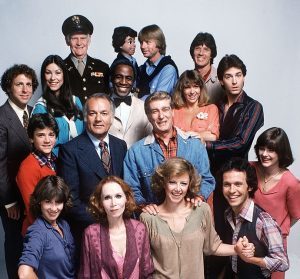 Soap (ABC, 1977-1981)
Soap (ABC, 1977-1981)The Original Premise: From Susan Harris (the creator of The Golden Girls and Empty Nest), Soap brilliantly blended slapstick comedy with the high-stakes, drama-filled framework of a soap opera. The show was the story of two sisters, Jessica Tate (Katherine Helmond) and Mary Campbell (Cathryn Damon). Jessica was married to the wealthy, conniving Chester Tate (Robert Mandan) and lived in the lap of luxury with her three children and butler. Mary was married to blue-collar, bumbling Burt (Richard Mulligan) and lived with her sons, including openly gay (and therefore immediately controversial for the era) Jodie (Billy Crystal).
Where We Left Off: Canceled abruptly after four seasons, the show ended with a string of unresolved cliffhangers. Mary worried that her baby was likely half-alien. After being hypnotized and regressed to a past life, Jodie believed that he was an old Jewish man. Burt, eying a career in politics, was ambushed by thugs who’d been told to kill him. And, somewhere in South America, a kidnapped Jessica faced an angry firing squad. The show faded to black with the sound of shots being fired.
Reboot Premise: Given the soap opera premise, anything is possible. Some configuration of the Tates and the Campbells, both from the original lineup and the next generation, could easily swing back into action.
What are the odds? Meh. Like Empty Nest, this show hasn’t gotten the same love as many of its peers, which is criminal, because it was rather unlike anything else. Soap operas aren’t quite as hot as they were back in the day, so spoofing them wouldn’t feel quite as intriguing as it did then. And while the show succeeded in pushing boundaries, what could it tackle now that might be equally controversial? Nevertheless, how much fun would this be? Of course, getting any of the original lineup to play would be the hardest part. Mandan and Helmond are both in their 80s; Mulligan, Damon and other principals are deceased; and many of the rest either work behind the scenes in Hollywood or don’t seem to be working in the industry at all. Billy Crystal is, of course, Billy Crystal, so there’s that.
Fun Fact: Fans of The Golden Girls may be interested to know that the classic “Always on your back, Blanche!” bit was a near-exact replica of a Soap scene between Helmond, Damon and a couple other characters.
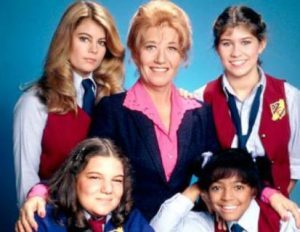 The Facts of Life (NBC, 1979-1988)
The Facts of Life (NBC, 1979-1988)Original Premise: A spinoff of Diff’rent Strokes, this show took housekeeper Edna Garrett (Charlotte Rae) and transplanted her to the Eastland School for Girls to serve as house mother and, later, the school dietician. Her primary charges were spoiled Blair (Lisa Whelchel), tomboy Jo (Nancy McKeon), budding writer Natalie (Mindy Cohn) and roller-skating Tootie (Kim Fields). The show changed its setup and cast continuously over the years, with ancillary characters (one of which was played by George Clooney) coming and going and the arena changing from the school to a bakery (Edna’s Edibles!) then an art deco gift shop. Mrs. Garrett and the girls, for whatever contrived reasons, perpetually kept finding reasons to live together. Rae eventually did depart, with Mrs. Garrett getting married and joining the Peace Corps. Oscar-winner Cloris Leachman took the helm as her sister, Beverly Ann.
Where We Left Off: That depends. Are we talking the show’s finale in 1988 or the 2001 reunion movie? Let’s cover both. On the show, in a last-ditch spinoff attempt, Blair bought the ailing Eastland, became its headmistress and began admitting boys. Juliette Lewis, Mayim Bailik and Seth Green were all in the episode. Meanwhile, Natalie was moving to Manhattan to live with a group of oddballs that included David Spade and Richard Grieco (another failed stab at a spinoff). Jo had become a social worker and got married, while fledgling actress Tootie was engaged. Mrs. Garrett was still in Africa in the Peace Corps., and Beverly Ann wasn’t doing much of anything. Jump to the 2001 reunion and Blair, now a lawyer in a strained marriage, had bought and renovated an inn, providing the venue for the reunion. Tootie had become a talk show host, was a widowed mom to a tween daughter, and insisted on not being called Tootie. Perpetually single Natalie was working as a journalist in Manhattan and was embroiled in a love triangle, which provided much of the movie’s action, eventually winding up with . Jo – while not in the movie – was also mom to a tween daughter, still married and apparently a cop. (McKeon was playing a cop in the Lifetime series The Division at the time, citing scheduling conflicts for her absence.) And Mrs. Garrett was figuring out things like email and what “jpeg files” were. No mention of Beverly Ann or any of the other long list of supporting players, except for a brief shout-out to Clooney’s character because, well, of course.
Reboot Premise: This one is tricky, but how about this: after getting divorced and losing most of her family fortune, Blair is forced to fall back on all those years of experience cooking at the school and at Edna’s Edibles by landing a job as Eastland’s new dietician. So, essentially, she becomes Mrs. Garrett 2.0.
What are the odds? Stranger things have happened. But why the Blair focus? Well, McKeon is in Texas raising a family, and Fields and Cohn seem to have multiple projects cooking if their active Instagram feeds are any indication. Whelchel has been looking to revive her show business career of late, after taking a couple decades off to be a mom, author and Christian speaker before resurfacing on a season of Survivor. So she’d probably be game.
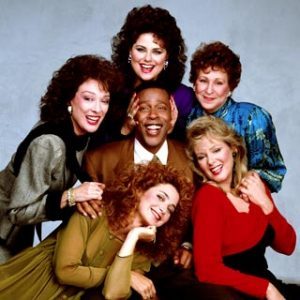 Designing Women (CBS, 1986-1993)
Designing Women (CBS, 1986-1993)Original Premise: Four Southern ladies ran a decorating firm in Atlanta, but instead of doing much decorating they sat around and discussed issues such as the battle of the sexes, motherhood, AIDS and occasionally even (gasp!) Donald Trump. There was strong-willed and liberal-minded Julia Sugarbaker (Dixie Carter); her shallow, beautiful sister Suzanne (Delta Burke); mousy divorcee Mary Jo (Annie Potts); and sweet, dim-witted Charlene (Jean Smart). Delivery man Anthony (Meshach Taylor) provided the male point of view, and wacky friend Bernice Clifton (Alice Ghostley) stopped by on occasion. Burke eventually left amid a tabloid-fueled battle with producers, with Newhart‘s Julia Duffy stepping in for a season as obnoxious cousin Allison. Forgetting to give the character even one redeeming quality, the audience hated her, and Duffy soon left, being replaced by Judith Ivey as wealthy widow B.J. Poteet. Meanwhile, Smart also vacated, with SNL alumna Jan Hooks stepping in as Charlene’s naive sister, Carlene.
Where We Left Off: Expecting an eighth-season pickup, there wasn’t much of a finale. The firm had fallen on hard times toward the end, basically being kept afloat by B.J.’s Poteet Industries parent company. After nearly losing the company in a corporate takeover, at the last minute the Sugarbakers team managed to save Poteet Industries and, therein, their own hides. Meanwhile, Burke went on to her own short-lived spinoff series, Women of the House, in which Suzanne became a congresswoman.
Reboot Premise: Well, the firm could still be operating out of Julia’s house, only now it’s occupied full-time by Mary Jo. At this point we’d be looking at a foursome of Suzanne, Mary Jo, Charlene and B.J. Hey, I’d watch that. I’ve always thought Ivey didn’t get a fair shake since the writing was rather subpar by the time she showed up.
What are the odds? Nonexistent – as they should be, honestly. Carter, Taylor, Ghostley and Hooks are all deceased. And, really, Designing Women without Dixie Carter? I mean, if anybody was irreplaceable. Plus, Tony-winner Ivey keeps busy with a stellar theater career and Potts has landed on CBS’s Young Sheldon. But, I must admit, I would love to hear these ladies’ take on a Trump presidency. In fact, I’ll leave you with this gem.
Interesting side bar: Carter herself was apparently a rather conservative Republican who would spout off Julia’s liberal tirades in exchange for the chance to occasionally sing on the show. Or so the story goes.
So there you have it. Five shows that should (or should not) get the reboot treatment. Admittedly, I’ve mined my personal list of favorites for this post. What did I leave out that you’d like to see revived? Comment below.
January 9, 2018
Some Thoughts on the Roseanne Revival
Are we in for a realistic take on a family politically divided or a vehicle for Roseanne Barr’s personal beliefs? (Also: The show we should’ve been watching all along.)
The Twitterverse has been alight with talk of ABC’s upcoming tenth season of Roseanne. Liberals are urging everyone to #BoycottRoseanne because of star Roseanne Barr’s support of Donald Trump. Conservatives, meanwhile, haven’t taken well to the notion that Darlene’s (Sara Gilbert) son is going to be gender-fluid (although they seem to have forgotten Barr’s butchering of the National Anthem back in 1990, which would lead to its own #BoycottRoseanne hashtag today). When a panel discussion with the cast derailed Monday into a series of characteristically controversial comments by Barr, as well as the reveal that Roseanne and Dan Conner are going to be portrayed as Trump supporters and at odds politically with other Conner family members, the Twitter-bashing ramped up again.
Briefly putting aside my views on Barr herself (more on that in a minute), I think that’s a brilliant setup for the Conners.
I loved Roseanne during its run and could easily relate to it. As far as I was concerned, Lanford, Ill., wasn’t too far removed from my hometown of Logan, W.Va. In its prime (roughly seasons 1-5), the show was a groundbreaking, realistic look at the struggles of working-class people who, often times, were barely scraping by. At home, they fought as hard as they loved and weren’t afraid to laugh at themselves. The Conners were more like the people I grew up around than any other TV family at the time. And, on another note, Barr never shied away from putting LGBT characters and issues front and center at a time when very few shows were doing it. So, okay, credit where it’s due. Barr changed the face of television in a lot of positive ways.
Somewhere around the sixth season, however, the lines between Roseanne Barr and Roseanne Conner began becoming increasingly blurred – and, as a result, both increasingly dislikable. I’ve never really been a Barr fan since – even less so given her current political beliefs and the general lunacy that has filled up her Twitter feed the past several years.
However – getting back to that “brilliant setup” remark – here’s why I’m going to give the reboot a whirl instead of boycotting it because I disagree with its star. As ridiculous and out of touch with reality as I find Barr’s viewpoints to be, she made a statement this week defending the show’s new premise that I can’t help but agree with.
“In the Roseanne show, I’ve always tried to have it be a true reflection of the society we live in. I feel like half the people voted for Trump and half didn’t, so it’s just realistic. And, in fact, it was working-class people who elected Trump, so I felt like that was very real and something that needed to be discussed and especially about polarization in the family and people actually hating other people for the way they voted, which I feel is not American.”
She’s right. After the 2016 election, I was left trying to find some kind of reconciliation between my extremely liberal views and the conservative, Trump-supporting leanings of my hometown crowd – the friends and family members that I love and respect and didn’t want to disengage from because of politics. In some cases – especially people I’d always thought to be rather progressive – the support of Trump was both baffling and unsettling. But, for whatever reasons, there we were. And here we are. Many of the blue-collar, working-class Democrats I grew up around are today’s Trump supporters. I think it makes perfect sense that, somewhere along the way, Dan and Roseanne Conner would’ve made the same transition.
Now the question remains: how well will the show portray this? Or, perhaps more to the point, how well will the show portray “Roseanne Conner”? Will we be seeing an actual character (i.e. Roseanne seasons 1-5) or will she be little more than a mouthpiece for the bitter, out-of-touch viewpoints of the actress behind her (seasons 6-9)? (I’m not concerned with how brilliant players like John Goodman and Laurie Metcalf will fare. They can take the worst material and make it entertaining.)
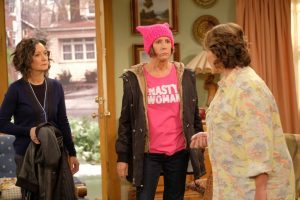 On the show, Roseanne Conner’s Trump support has caused a rift between her and sister Jackie (Metcalf). One promo still shows Jackie facing off against Roseanne while wearing a “Nasty Woman” shirt, suggesting that the Conners are indeed quite divided in their political leanings. If done well – and if they’re able to recapture some of the spirit and strength of the show’s earlier years – this could be a worthy take on a politically divided family, as so many families in our country are today. But achieving that would perhaps require minimal input from the show’s namesake…which seems unlikely.
On the show, Roseanne Conner’s Trump support has caused a rift between her and sister Jackie (Metcalf). One promo still shows Jackie facing off against Roseanne while wearing a “Nasty Woman” shirt, suggesting that the Conners are indeed quite divided in their political leanings. If done well – and if they’re able to recapture some of the spirit and strength of the show’s earlier years – this could be a worthy take on a politically divided family, as so many families in our country are today. But achieving that would perhaps require minimal input from the show’s namesake…which seems unlikely.
But not impossible. Todd VanDerWerff at Vox offers this review: “The irony of this is that the new Roseanne — absent the star’s political leanings — is a genuinely funny, thoughtful take on how white Americans who disagree strongly over the president and his views on essentially anyone who’s not a white American can find a way to talk about these issues without killing each other. The show feels reinvigorated by the political climate in a way that, say, NBC’s Will & Grace reboot just doesn’t.”
With people like Gilbert and Wanda Sykes on the production team, and Barr having input on scripts, the scales could tip either way. Early reviews of the first episode suggest it mirrors the feel of the original — but which era of the original?
I guess we’ll have to tune in and decide for ourselves – if we choose to. VanDerWerff offers what I think is an appropriate summation: “If the new Roseanne is thinking about how dicussing politics has fractured relationships in these 2010s, it’s a dark twist that fans will now have to ask themselves whether Barr’s politics will dampen their love for the show.”
Roseanne returns to ABC March 27.
Meanwhile…
Why “Crystal” is the Show We Should’ve Been Watching All Along
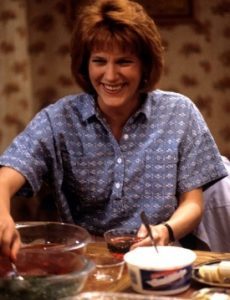 I always thought the character of Crystal Anderson, Roseanne’s long-suffering friend, was who we should’ve been watching all along. Played by the underrated Natalie West (who’ll be back for the reboot), the character’s various throwaway lines, when put together, paint the picture of a woman who faced more hardship and pain than all the Conners combined. Listen to this: Thrown out of her parents’ house at 16, married at 17, divorced at 18. A tornado carried off her car. She was hospitalized for pneumonia. Her second husband, a welder, cut their trailer in half when they split up. Her third husband died when he fell into a bridge while working construction and became permanently encased in it, leaving her a widow and a single mother. After a string of breakups, she married Dan’s dad – a traveling salesman twice her age – and had two kids by him within a year, which she pretty much raised alone because he was constantly on the road. And then, well, she was basically written out of the show about midway through. Come on! What a prequel goldmine. I think Crystal deserves the Young Sheldon treatment. Who’s with me? #YoungCrystal!
I always thought the character of Crystal Anderson, Roseanne’s long-suffering friend, was who we should’ve been watching all along. Played by the underrated Natalie West (who’ll be back for the reboot), the character’s various throwaway lines, when put together, paint the picture of a woman who faced more hardship and pain than all the Conners combined. Listen to this: Thrown out of her parents’ house at 16, married at 17, divorced at 18. A tornado carried off her car. She was hospitalized for pneumonia. Her second husband, a welder, cut their trailer in half when they split up. Her third husband died when he fell into a bridge while working construction and became permanently encased in it, leaving her a widow and a single mother. After a string of breakups, she married Dan’s dad – a traveling salesman twice her age – and had two kids by him within a year, which she pretty much raised alone because he was constantly on the road. And then, well, she was basically written out of the show about midway through. Come on! What a prequel goldmine. I think Crystal deserves the Young Sheldon treatment. Who’s with me? #YoungCrystal!
December 31, 2017
Best Books of 2017
It’s been a while since I’ve compiled a “best of” list of the books I’ve read over the course of the year, but seeing as how I’m attempting to reinvigorate the blog, I thought I’d offer a list of my recent favorites. When looking back on my favorite books of the year, a couple patterns emerged. Apparently, this year I was really into politics, mystery and the musings of authors better known as actors.
In random order, here are my favorite books of 2017.
The Dangerous Case of Donald Trump by Bandy Lee, M.D., M.Div. – This book was illuminating, captivating and frightening. A group of psychiatrists and mental health experts assess Donald Trump’s mental capabilities to serve as President of the United States. The essays are jarring, as these professionals risk credibility by sidestepping the American Psychiatric Association’s Goldwater rule, which prevents psychiatrists from making armchair diagnoses of public figures. This was the most important book I read this year.
Fantasyland: How America Went Haywire: A 500-Year History by Kurt Andersen – Curious how we ended up where we found ourselves in the previous book on this list? Then give this one a try. I haven’t finished it yet, but it’s gripping enough to put here anyway.
Growing Up Fisher by Joely Fisher – My recent rewatch of Ellen on Hulu put Joely Fisher back onto my pop culture radar. The daughter of Connie Stevens and Eddie Fisher, and half-sister of Carrie, Joely was born into show business royalty. The book is full of interesting insights, with added weight provided by the recent deaths of Carrie and her mother, Debbie Reynolds. The subtitle – Musings, Memories and Misadventures – attempts to explain the occasionally meandering writing style that was a little off-putting at times. But, as a whole, an intriguing celebrity bio and a nice counterbalance to the heaviness of my previous entries on this list.
The Dire King by William Ritter – I loved the Jackaby series when it launched a few years ago. Ritter blended elements of science fiction, magic and mystery in his world building, drawing comparisons to a “Doctor Who meets Sherlock Holmes” hybrid. Admittedly, I preferred the earlier books in the series, which were heavier on the mystery instead of the fantasy, but The Dire King, which concludes the four-part series, was an enjoyable ender.
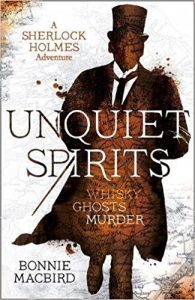 Unquiet Spirits by Bonnie Macbird – Speaking of Sherlock Holmes, Macbird has picked up the pen originally held by Sir Author Conan Doyle, writing gripping novels about the continuing cases of Holmes and the faithful Dr. Watson. Unquiet Spirits is the second in Macbird’s series, with a third on the horizon. Fittingly, I discovered these books at The Poisoned Pen, a mystery-themed bookstore in Scottsdale, Az., and devoured them.
Unquiet Spirits by Bonnie Macbird – Speaking of Sherlock Holmes, Macbird has picked up the pen originally held by Sir Author Conan Doyle, writing gripping novels about the continuing cases of Holmes and the faithful Dr. Watson. Unquiet Spirits is the second in Macbird’s series, with a third on the horizon. Fittingly, I discovered these books at The Poisoned Pen, a mystery-themed bookstore in Scottsdale, Az., and devoured them.
Meddling Kids by Edgar Cantero – This interesting novel draws its inspiration from the old Scooby Doo, Where Are You? cartoons, imagining what might’ve happened to a group of mystery-solving youngsters and their dog once they’ve grown up and their past comes back to haunt them.
Norse Mythology by Neil Gaiman – Masterful storyteller Gaiman puts his own unique spin on the Norse myths. Need I offer any additional reason to read this?
What Happened by Hillary Clinton – “What must Hillary be thinking during all this?” was a question I asked myself multiple times following the results of the 2016 presidential election. This book answers that question rather thoroughly.
The Hate U Give by Angie Thomas – An important and timely read addressing race relations about a teenage girl who watches her (innocent) friend get shot and killed by police.
Uncommon Type by Tom Hanks – While I enjoy Hanks as an actor as much as any of us does, I wouldn’t necessarily have clamored to pick up his first work of fiction if not intrigued by its premise. Each of the selections in this short story collection somehow involves a typewriter. I love typewriters. And Hanks proves adept at prose. I must not have been alone in my desire to pick this up. The clerk at my local bookshop acted as though I wasn’t the first person to ask about it when I didn’t find it on the shelves.
The Magic Misfits by Neil Patrick Harris – While we’re on the subject of actors-turned-authors, Harris takes a stab at children’s fiction in this fun book that incorporates his love of magic into a middle grade mystery. The first of four books, apparently.
While I’m here, I may as well offer a few other favorites from the year in entertainment.
 Music: Spoiler alert: They’re almost all folky singer-songwriters.
Music: Spoiler alert: They’re almost all folky singer-songwriters.
The Order of Time by Valerie June | Lost at Last Vol. 1 by Langhorne Slim | Busted Jukebox Vol. 2 by Shovels & Rope | Girlhood by The Preatures | Nobody’s Fool and the Donor Blues EP by Shakey Graves | Snow by Angus and Julia Stone | Folksinger Vol. 2 by Willie Watson | Carry Fire by Robert Plant | Poor David’s Almanack by David Rawlings | The Songs of Bob Dylan by Joan Osborne
Television: There is simply too much good TV on these days.
The Marvelous Mrs. Maisel (Amazon) | American Gods (Starz) | Twin Peaks: The Return (Showtime) | Stranger Things 2 (Netflix) | The Good Place (NBC) | Big Little Lies (HBO) | American Vandal (Netflix) | Veep (HBO) | The Toys That Made Us (Netflix) | Psych: The Movie (USA) [It’s essentially a 2-hour episode of the show, so I’m putting it here.]
Movies: Confession: I didn’t see a lot of movies this year, but these were all wonderful.
Loving Vincent | The Florida Project | Lady Bird | Wonder Woman | A Ghost Story
December 3, 2017
Remembering Ellen’s Coming Out
I recently discovered that Ellen, Ellen Degeneres’s sitcom which ran on ABC from 1993 to 1998, is on Hulu!
It’s funny as I’ve revisited the show how clearly I remember watching the episodes when they first aired – especially the infamous “Puppy Episode” from April 1997, in which Ellen’s character, Ellen Morgan, came out as a lesbian – just as Ellen Degeneres did herself in real life on the cover of TIME magazine. It was, then and now, monumental for so many reasons. It was the first time the lead character in a sitcom came out. There had been gay characters on TV before then, sure, but they were often simply there as plot devices for jokes (Blanche’s brother on The Golden Girls) or for “very special episode” message delivery (the young gay man dying from AIDS on a powerful Designing Women). And let’s not forget Billy Crystal on the groundbreaking Soap, whose openly gay character eventually began a relationship with a woman in an attempt to sort of quell the backlash.
But back to Ellen.
Earlier this year, Ellen devoted an entire episode of her talk show to celebrating the 20th anniversary of “The Puppy Episode,” in which she revisited all the wonderful highs and terrible lows that resulted from it – and even reunited most of the episode’s cast: Joely Fisher, David Anthony Higgins, Clea Lewis, and guests Oprah Winfrey and Laura Dern. It’s worth the time to view the entire episode, which you can do here.
 The cast of “The Puppy Episode” reunited on The Ellen Degeneres Show April 2017.
The cast of “The Puppy Episode” reunited on The Ellen Degeneres Show April 2017.I was surprised at how emotional I became while watching the anniversary special. Part of my reaction stemmed from being reminded of the negative backlash Ellen suffered in response to her honesty, as well as being reminded of where we were at that time in terms of acceptance and equality.
A bigger part of my reaction, however, came from remembering where I was in my own life and with myself at the time. It provided an opportunity to think about how the episode impacted me. I was a junior in high school in April 1997, on the edge of 17, in a very small town in Appalachia. I wasn’t out. And when I say I wasn’t out, I don’t mean to my family or friends. I mean to myself. I was in deep denial. I was pretending I wasn’t gay as I sort of drifted through the days. I was trying to be “normal,” attempting to bury the hurt of the insults that would be hurled my way by people who’d already figured out my secret and to reconcile my inner feelings with the religious beliefs I’d been raised around. I’d come home and pour out my feelings through writing, which became so vital in my ability to cope. (Reading those old pieces now is both heartbreaking and inspiring. Here’s one written at the time this episode aired, as well as a few others.) I’d attempt the classic “pray it away” approach at night and repeat the cycle over again when the sun came up in the morning.
That was my life, or at least a segment of it.
I watched “The Puppy Episode” with my mom and grandmother that night, not because of the hype surrounding it, but simply because we watched Ellen every week anyway. The episode amazed me. Here was, for the first time, a well-known character (and actor) coming out on national television in front of millions of people (more than 40 million to be exact). As you know, this was pre-Will and Grace, pre-Modern Family, pre-Just About Every Out Celebrity. Okay, that’s unfair. There were plenty of openly gay celebrities, of course, but I don’t think they were necessarily celebrated as such. Just watch the clips of the backlash in the first few minutes of the episode linked above and you’ll understand why. Then, suddenly, Ellen broke down those walls. To my small-town, uncultured, unexposed, deeply closeted teenage self, it was awe-inspiring.
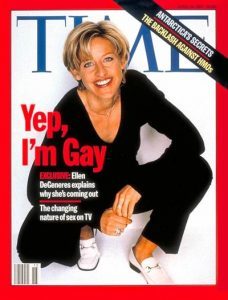 If Ellen could do it, why not me, right?
If Ellen could do it, why not me, right?
So when the episode ended, I turned to my mom, and I said, “Mom…I’m gay, too.”
Okay, that didn’t happen. But what did happen was, somewhere inside of me, a seed was planted – a seed that suggested maybe, just maybe, what I was feeling was okay. That seed took quite a while to germinate. I didn’t come out (to myself or to my family and friends) for two more years. But I have to hand it to Ellen Degeneres for being one of the first people to really help me begin to look at things differently – to view myself and my feelings not as something to fear or be ashamed of, but to celebrate.
Now, here we are 20 years later, and look at how far we’ve come. I can live my life openly and have the acceptance of my family and friends. Gay marriage is legal. Ellen can devote an entire episode of her talk show to the fact that she’s gay and not raise any eyebrows. It’s a far cry from 1997. The sitcom, unfortunately, suffered after the coming out, only lasting one more season following “The Puppy Episode.” The last season followed Ellen on her first lesbian relationship, which apparently proved too gay for mainstream America, leading to troubles with advertisers, clashes with producers over content, and diminished ratings. (Personally, I thought the bigger problem wasn’t that Ellen Morgan was exploring her sexuality, but that she did so at the expense of the show’s valuable ensemble, all of whom were largely relegated to thankless B plots or recurring status. Ellen herself was always the draw, but it was like watching Seinfeld without Elaine, George and Kramer.)
So while Ellen faded from view, it’s now accessible in all its glory on Hulu. And, I must say, two decades later “The Puppy Episode” holds up.
Inevitably, appreciating how far we’ve come requires acknowledgment of how far we have yet to go. Let us not pretend for an instant that there aren’t still people living the very life I described for myself above. But I’m not going to address that here, instead focusing on the progress. We – and I – have indeed come such a long way in 20 years. While it wasn’t something I necessarily acknowledged at the moment, with distance and perspective I can certainly point to Ellen’s coming-out episode as a touchstone in my process of self-acceptance, at a time when I needed it so desperately.
And for that, Ellen Degeneres, I say thank you.
December 17, 2016
This 1991 episode of Wings predicted the 2016 presidential election
It's Roy vs. Fay for Nantucket town council, and guess who wins bigly?
A 1991 episode of the TV sitcom Wings, entitled “If Elected, I Will Not Live,” provides further proof that good writing is timeless – and that our American political system hasn’t changed all that much in 25 years. The episode is an eerily timely precursor to the 2016 presidential election (and accurate glimpse of our political arena altogether) that sees smarmy businessman Roy Biggins facing off against seasoned, intuitive Fay Cochran for Nantucket town council.
If you’re unfamiliar with the show’s premise, Wings centers around uptight, straight-laced Joe Hackett (Tim Daly) and his flaky, ne’er-do-well brother Brian (Steven Weber), who together run Sandpiper Air, a small, commuter airline on the island of Nantucket, Mass. They’re joined by Fay (Rebecca Schull), the sweet, grandmotherly ticket agent; Lowell (Thomas Haden Church), the dopey mechanic; aspiring classical musician Helen (Crystal Bernard), who runs the lunch counter; immigrant cab driver Antonio (Tony Shalhoub); and slimy Roy (David Schramm), who owns Aeromass, a competing airline. The show ran on NBC from 1990 to 1997 (and in constant reruns for years on USA).
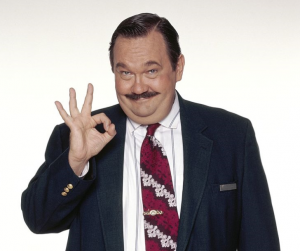 In the episode, Roy suddenly finds himself running unopposed for town council when his opponent suffers a heart attack. Having never held a political office before, Roy is quick to figure out how to play the game to his advantage. He saunters through the terminal, shaking hands, patting backs and kissing babies. (He quickly hands an infant back to its mother the second it starts to cry). He remarks to Joe and Brian, “This politics game isn’t so tough. You just smile a lot, press the flesh a little and tell people what they want to hear.”
In the episode, Roy suddenly finds himself running unopposed for town council when his opponent suffers a heart attack. Having never held a political office before, Roy is quick to figure out how to play the game to his advantage. He saunters through the terminal, shaking hands, patting backs and kissing babies. (He quickly hands an infant back to its mother the second it starts to cry). He remarks to Joe and Brian, “This politics game isn’t so tough. You just smile a lot, press the flesh a little and tell people what they want to hear.”
[A manipulative conman coasting to victory with no real experience or plans? Hmm…]
As Helen aptly remarks, “Here’s a frightening thought: Roy Biggins is going to be our next councilman. I hate to be a cynic, but isn’t that the way it always goes? You either have bad choices or no choices at all.”
[Frustrated citizens lacking faith in the system and adopting a “lesser of evils” approach to voting? Hmm…]
In an effort to avoid disaster, Joe enters the race, positioning himself as a practical, youthful and good-looking alternative, with Fay as his campaign manager doing all the actual grunt work behind the scenes.
[A woman (an older woman, at that) doing the heavy lifting, while a handsome white man gets the glory? Hmm…]
When a reporter realizes that Fay is actually the brains behind the operation, she gets the local newspaper’s endorsement, which pretty much makes a candidate a shoo-in for election.
[Media coverage attempting to steer election results? Hmm…]
With the tables turned and Fay now on track to victory, Roy appeals to her soft side with a sob story about his deep-seeded insecurities resulting from childhood bullying. He launches the story with this candid gem: “I know you think I’m just another bigot running for town council in order to line his pockets.”
[A rich bigot running for office on a power trip? Hmm…]
Roy urges Fay to blow their upcoming debate so the he can finally, for once in his life, feel like a winner (despite the fact that he is a successful business owner whose seven-plane airline dwarfs Joe’s one-plane operation). While Fay goes into the debate seeming to have ignored Roy’s plea, she can’t shake the image of “poor, pitiful Roy” as the event unfolds. The manipulation works, and when she has the chance to fling some mud and secure her victory, she instead throws support to her opponent: “As for his programs they seem…solid and well thought out,” she says while imagining a humiliated, bullied young Roy standing beside her. “I would like to commend Roy for his vision, and suggest we all listen a little more closely to what he has to say.”
In the end, Roy becomes a Nantucket town councilman and, after trash talking Fay along the campaign trail, pulls her aside to make nice.
[Dogging an opponent only to change tunes when playing nice could lead to personal advantage? Hmm…]
In his victory speech to the gathered crowd in the airport terminal, Roy vows to be a great councilman for all the people of Nantucket and declares that it’s time to break out the champagne. When the crowd attempts to join the celebration, he shouts a stern “Who invited you?” and slams his office door to celebrate in his private office, away from the peasants.
[Forgetting about the people and the promises the minute you take office? Hmm…]
I watched this episode (it’s on Hulu and YouTube) thinking, “Wow, this all seems gut-wrenchingly familiar.” It is rife with parallels to the recent presidential election. (I’m not suggesting Hillary Clinton is as wholesome as sticky-sweet Fay, but doesn’t Roy Biggins make the perfect Trump, his hair slicked back with oil as opposed to combed over? Oh, and speaking of hair, let's not neglect Helen's Topsy Tail 'do in one scene.) Of course, it’s a timely depiction not only of this election, but also our political landscape and, well, society in general. We’ve come so far, yet we’ve gone nowhere at all.
(Oh, and I haven't even mentioned a subplot that has Helen giving up on her dream of being a concert cellist. How many of us have been in an "I give up" slump lately?)
Yes, America, next month Roy Biggins will be sitting in the Oval Office. Attention Sandpiper passengers, our collective sanity is now departing through Gate 1.
November 18, 2016
Mountain Woman: Reflections on Life in the Appalachian Coalfields
Earlier this year, I was invited by Voices of Appalachia to write a piece about Appalachian culture. I chose to interview my mother about her experiences growing up, getting married, raising a family and retiring in the coalfields of Logan County, W.Va.
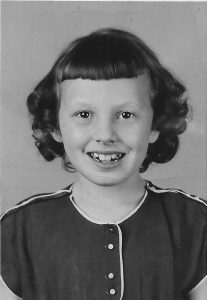 On a typical Sunday morning drive through Omar, W.Va., about 10 miles south of the Logan County seat, there’s little activity along the two-lane road that winds its way through the community. Once a bustling coal town nestled between the mountains, empty storefronts and pothole-lined streets suggest a place whose best days may be behind it. Yet children's toys line front yards, people gather at the lone filling station to discuss the day’s news, and the parking lots of the area’s many churches spill cars into the street.
On a typical Sunday morning drive through Omar, W.Va., about 10 miles south of the Logan County seat, there’s little activity along the two-lane road that winds its way through the community. Once a bustling coal town nestled between the mountains, empty storefronts and pothole-lined streets suggest a place whose best days may be behind it. Yet children's toys line front yards, people gather at the lone filling station to discuss the day’s news, and the parking lots of the area’s many churches spill cars into the street.
For some longtime residents, however, this version of Omar is far removed from the one of years past. And yet, it remains home.
At age 3, Kathy (Sizemore) Browning moved with her parents and younger brother from Norton, Va., to Omar. The year was 1951, and Kathy’s father, a World War II veteran, was seeking work in the coal mines. Built upon a thriving coal industry, Omar seemed as good a place as any to settle down.
“Dad and my uncle decided to move to West Virginia I guess because the coal jobs were available, and it wasn’t too far from where we were at the time,” Kathy says. “Plus, they both played baseball, and the coal companies had teams.”
Kathy’s early memories of the town differ greatly from what she sees today. “Back in those days, there were nice stucco homes, the big general store, and there was a theater near the train tracks that’s long gone.”
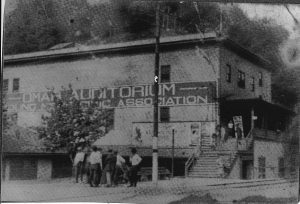 The Sizemore family moved into an apartment above the theater, where a young Kathy quickly made herself at home. “I used to go downstairs, and the women who worked at the theater would let me run up and down the aisles or play in the ticket booth. They let me have the run of the place.”
The Sizemore family moved into an apartment above the theater, where a young Kathy quickly made herself at home. “I used to go downstairs, and the women who worked at the theater would let me run up and down the aisles or play in the ticket booth. They let me have the run of the place.”
Jobs like working at the theater, though, were rare. In Omar, if you were employed, it was most likely in the mines or for the company that owned it.
“I don’t know of anybody that didn’t work for the coal company. That’s all there was as far as I know,” Kathy says. “The coal company owned everything – the store, the houses you rented. All of it.”
The miners wouldn’t get paid in money. They’d get what they called scrip that they’d use at the company store in exchange for goods. The store stocked everything a family would need, from food to furniture to clothes. People would place a call to the store, give the clerk their list, and the order was delivered to the front door, because no one had transportation unless they owned a horse. In fact, the grocer wasn’t the only one making house calls. The town doctor – also a coal company employee – would come to those in need.
“Dr. Moore was the doctor’s name, and if you got sick, he’d come to the house,” Kathy recalls. “You always got a shot of penicillin and those old gray cough tablets that were like charcoal. You knew when you’d see him coming that you were going to get a shot, so we’d start crying the minute we saw him coming up the road.”
From the basic needs of food and shelter to medical care, it was all controlled by the coal company. Kathy recalls a line from the Tennessee Ernie Ford classic “Sixteen Tons,” which, she says, rang true for the people of Omar.
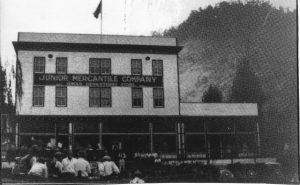 “There’s that old song lyric, ‘I owe my soul to the company store.’ It was the truth. There were many times Dad didn’t get a paycheck. He owed it all to the company store. We used to go to the soda fountain in the store and order milkshakes and candy and charge that to Dad’s account, too.”
“There’s that old song lyric, ‘I owe my soul to the company store.’ It was the truth. There were many times Dad didn’t get a paycheck. He owed it all to the company store. We used to go to the soda fountain in the store and order milkshakes and candy and charge that to Dad’s account, too.”
Having the secure income that a coal job provided didn’t mean life was easy. Many of the homes didn’t even have indoor plumbing.
“We moved from the theater to a small place in nearby Chauncey that had a gas furnace and inside bathrooms. I think we were the only house in Chauncey that had that. And all the school teachers at the four-room schoolhouse down the hill would come up to our house and smoke with Mom during recess.”
This lifestyle carried Kathy through her childhood, but in the early 1960s, she noticed things beginning to change. As automobiles became more prevalent, people were less reliant on the coal company store and were venturing elsewhere for their needs.
“We moved from Chauncey back to the main street in Omar when I was in the 10th grade, and it was around then I noticed things were getting a little bit better. More people had cars, and they’d drive to Logan to shop or go to the old drive-in theater in Monitor. They had the best hamburgers you ever had in your life at that theater.”
Slowly, the days of coal company-owned life dwindled as more and more people ventured beyond Omar’s borders to trade. Even then, the decline in the coal industry was evident as mines began to close and people moved on.
“People just got away from that,” Kathy says. “Just like now, mines would close down, people would move away, same as it is today. It seems to me that around the time I was in high school, all those things were gone – the theater, the store, they weren’t there anymore. Once people got transportation, they were going to Logan to do their shopping.”
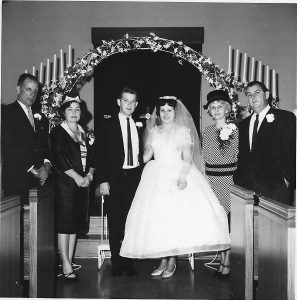 While in high school, Kathy met her future husband, Stacey Browning, the son of her first and second grade teacher, Inamae Crockett Browning, a descendent of frontiersman and politician Davy Crockett. The two dated while Kathy finished high school and married in November 1966, shortly after her graduation.
While in high school, Kathy met her future husband, Stacey Browning, the son of her first and second grade teacher, Inamae Crockett Browning, a descendent of frontiersman and politician Davy Crockett. The two dated while Kathy finished high school and married in November 1966, shortly after her graduation.
“He bought me a ring. It had a little, tiny, itty-bitty diamond that was so small you couldn’t even see it. I don’t even have it anymore. I lost it down the sink!”
The newlyweds rented a small house in the nearby hollow of Cow Creek.
“We paid $25 a month in rent,” she says. “Stacey delivered for the bakery, and I worked at Dot Discount, a drugstore, and then at Sayre Bros. department store. We didn’t have a car at first, so we got a ride to town with our neighbor, or Stacey would bring the bread truck home sometimes.”
The couple eventually moved to Delbarton, in Mingo County, and had their first child, daughter Cindy, in 1970. They then moved to a mountaintop on the West Virginia-Kentucky border.
“Stacey was a forest ranger, and I got a job as a tower observer,” she says. They lived in a small cabin at the base of the tower. “It was a nice little cabin, had a shower in the basement, and the toilet was outside, over the hill.”
Watching for fires proved to be a secure job.
“Lord have mercy, the world would burn up! There were always fires going,” she recalls. “They paid 25 cents an hour to fight fires, so people would set fires just to get the 25 cents an hour to go fight them.” The remote location of a mountaintop tower, however, didn’t necessarily provide security. “I wore a holster and a gun,” Kathy says. “People would try and break in on you up there in those towers.”
With so many hours to kill and so much to see from a mountaintop tower, it was easy to become distracted if activity did occur, whether or not it was fire-related.
“On Sundays, all the young people would come up and make out in their cars on the hill where I was. So one day, I had my binoculars out, and I was watching them. I got a call on the radio saying, ‘Mingo, I’m seeing a lot of smoke in your area. You got a fire over there?’ I turned around and the whole daggone mountainside behind me was burning up while I was watching the lovebirds!”
Eventually, Mother Nature wore out her welcome on the mountaintop. The storms were so strong that wind would jostle the tower, and lightning would often strike the cabin, burning up the telephone line and light bulbs. It became too much for the Brownings.
“It’d scare our German Shepherd to death. He’d disappear for hours at a time during a storm.”
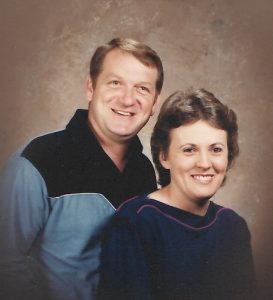 After coming down from the mountain, the family lived with Kathy’s parents for a time, then moved to the Mingo County town of Red Jacket before landing once again in the Omar area, first in the Barnabus community then back to Cow Creek. Stacey and Kathy welcomed two more children along the way – son John in 1976 and Matthew in 1980 – and have called Cow Creek home ever since.
After coming down from the mountain, the family lived with Kathy’s parents for a time, then moved to the Mingo County town of Red Jacket before landing once again in the Omar area, first in the Barnabus community then back to Cow Creek. Stacey and Kathy welcomed two more children along the way – son John in 1976 and Matthew in 1980 – and have called Cow Creek home ever since.
Kathy has watched the coal industry’s effect on her town from its early, successful days, to its steady decline. She recalls her life in Omar with a fondness that, while still evident, has shifted in recent years.
“I liked it better back then. Now a lot of the houses are run down. Back then, the houses were nice – the coal company houses. You had people out on their porches talking all the time. You don’t see that much anymore.”
It’s still a good place, still home, she says. But different.
“You might as well say Omar is like a ghost town compared to back in those days, because you had so much going on. Nobody had any money, but there was a lot going on. Everybody got along. Us kids would go outside and go into the mountains and play and stay all day. We didn’t have to worry about anybody kidnapping us. It was a different set of problems than what goes on today.”
With the expansion of cleaner and cheaper energy sources and stricter environmental regulations on coal mining, leading to what some in the region call a “war on coal,” many people who have long relied on coal to put food on their family’s table are left without a job – or a marketable skillset to fall back on.
“It’s bad. The coal mines keep closing down. They’re laying off so many miners,” Kathy says. “There’s hundreds and hundreds laid off every other week around here, it seems. The government has been trying to train people to do other stuff, but I don’t know how that’s going to work out. A lot of people could end up having to move away to find work.”
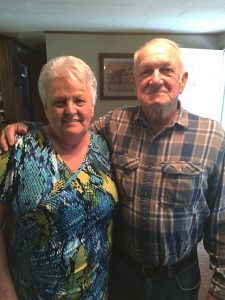 Many in the region are hoping that changes in the political landscape, including electing coal magnate Jim Justice governor of the state, could help to turn the tide. While Kathy is hopeful for a better future for her town, she's also cautiously realistic. Now retired, and with their children long out of the house, will she and Stacey consider a move out of Omar? It isn’t likely.
Many in the region are hoping that changes in the political landscape, including electing coal magnate Jim Justice governor of the state, could help to turn the tide. While Kathy is hopeful for a better future for her town, she's also cautiously realistic. Now retired, and with their children long out of the house, will she and Stacey consider a move out of Omar? It isn’t likely.
“Stacey wouldn’t hear of moving away,” she says of her husband, now 70, who was born in Cow Creek. “And I wouldn’t want to be too far away from the kids.”
Daughter Cindy married a coal miner and lives with her family in nearby Switzer. Older son John and his family reside in Logan, and youngest Matthew in Charleston, the state's capital city. Kathy and Stacey welcomed their first great-grandchild in 2016.
In November 2016, Kathy and Stacey celebrated their 50th wedding anniversary. At age 67, with an extended family of children, grandchildren and great-grandchildren, packing up and leaving just doesn’t seem worth it to Kathy at this point in her life.
“Really, when you get to be our age, you’re too old to go anyway.”
Like so many of the mountain men and women in the town of Omar, for Kathy Browning, it would seem her roots are firmly planted. As the times continue to change, however, what will grow around those roots remains to be seen.

